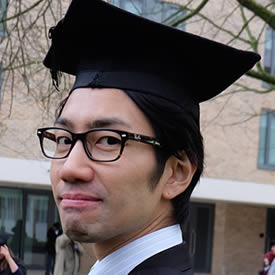Daisuke Nakayama
Country of origin: Japan
SAP Consultant, IIJ Ltd
I was working in the IT industry for more than eight years and most of my career consisted of work related to SAP Enterprise Resource Planning (ERP) software from Germany. I started my career in Tokyo as an SAP systems engineer at a Japanese systems integrator. After four years, I moved to a domestic consulting firm, QUNIE Corporation, to further my career as a SAP financial module consultant. I worked on several SAP global roll-out projects, particularly for overseas branches of a Japanese manufacturer in the United States, Germany and China. In these projects, I was leading the financial module team and managed tasks, on-time schedules and work quality for foreign subcontractors.
When I turned 30, anxiety kicked in and I started thinking about my future career. I was keen to cultivate any potential capability in myself. At the same time, while I was technically mature as a SAP consultant/engineer with global roll-out project experience, I judged that I suffered critical deficiency of the softer skills necessary to compete and survive in the global business arena, including project facilitation and change management.
I chose the Lancaster MBA because of its great reputation in the Financial Times Global MBA Ranking, and because the curriculum covered broad business issues and included practical modules — the Consultancy Challenge and the Corporate Challenge. I also received a significant scholarship.
The one-year MBA programme was much more intense than I expected. It consisted of real-life experience looking at how we would perform as global leaders rather than studying academic subjects alone. There was also a good deal of collaborative work. During my MBA study, I enjoyed interaction (which sometimes turned to conflict) with multi-national classmates the most. There were 36 students with 20+ nationalities from a variety of professional backgrounds, including banking, auditing, consulting, manufacturing, IT, marketing, education and more. Around 10 students were from worldwide consulting firms - PwC, EY and KPMG. Furthermore, no nationality was dominant as there was a maximum of 3-4 students from any one country.
I succeeded in expanding my comfort zone substantially, which was the most beneficial outcome of the Lancaster MBA for me. The professors organised teamwork in each module for discussions about real business, on which we usually did group presentations. Through this learning process, we subconsciously maximised our softer skills so that we became adept at facilitating multi-national projects.
While interacting with my peers, I realized I was enthusiastic about describing my local culture to Western people who did not properly understand my country. This made me want to stay in London as my next step. I have managed to secure a position as a SAP consultant with my current employer, IIJ Europe in London, providing IT services and both hardware and software especially for Japanese enterprises that are penetrating the European market.
In conclusion, the Lancaster MBA played a crucial role in changing my life. I would not have anticipated my current circumstances if I had not decided to study the Lancaster MBA.


